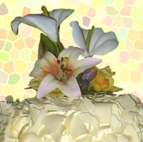

Flavours
& Decorations » Costs »
Upcoming
Events » Home » Gallery
![]() The
Special Occasion Cake Company
The
Special Occasion Cake Company
The Wedding Cake Tradition The origin of the wedding cake is surrounded in symbolism for fertility or prosperity. Loaves of wheat bread were broken over the bride’s head by the groom during the Roman Empire as a symbol of fertility. The guests were offered to eat the crumbs that fell off the “lucky” cake - usually found on the bride or the floor. Not exactly the tastiest idea! During the Middle Ages, the wheat loaves evolved to sweet buns or cakes that were brought by the wedding guests. At the end of the ceremony, all the cakes were stacked into an enormous pile. The bride and Groom had to successfully kiss over the pile to ensure prosperity. Since the taller the pile, the more prosperous the couple, the bride and groom often stood on the cakes to accomplish this task. Not many guests were too excited about eating cake that had been trampled! In the 16th century a French chef visited London during the reign of King Charles II and observed the prosperity pile. Being disgusted by the English wedding cake tradition, he returned home to France where he created a cake that resembled a pile of buns (multi-tiered), looked sensational, and tasted great. Finally, something the guests could enjoy! Today, the groom feeds the first bite of the wedding cake to the bride and then the bride feeds the piece to the groom symbolizing the couple’s willingness to share and support each other in their life together. The wedding cake is no longer a symbol of fertility or prosperity
but none-the-less is still steeped in tradition that represents
the abundance of blessings bestowed upon the happy couple. Today,
the top layer is usually saved by the couple then eaten on their
first anniversary. It is recommended that the layer is tightly
wrapped and stored in an airtight container and kept frozen. After
all, the cake will be one year old and that alone means it will
be difficult to retain its flavor. |
Recent Creations |
This site was created by and hosted by Genesys Networks




